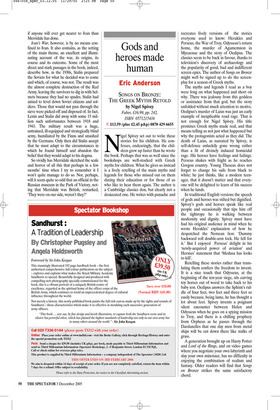Gods and heroes made human
Eric Anderson
SONGS ON BRONZE: THE GREEK MYTHS RETOLD by Nigel Spivey Faber, £16.99, pp. 242, ISBN 0571215416 ✆ £13.59 (plus £2.45 p&p) 0870 429 6655 Nigel Spivey set out to write these stories for his children. He conesses, endearingly, that the chilfdren grew up faster than he wrote the book. Perhaps that was as well since the bookshops are well-stocked with Greek myths for children. What he gives us instead is a lively retelling of the main myths and legends for those who missed out on them during their education or for those of us who like to hear them again. The author is a Cambridge classics don, but clearly not a desiccated one. He writes with panache and recreates lively versions of the stories everyone used to know: Herakles and Perseus, the War of Troy, Odysseus’s return home, the murder of Agamemnon in Mycaenae and the story of Oedipus. The classics seem to be back in favour, thanks to television’s discovery of archaeology and the popularity of good, bad and indifferent screen epics. The author of Songs on Bronze might well be signed up to do the screenplay for a season of Greek myths.
The myths and legends I read as a boy were long on what happened and short on why. There was jealousy from this goddess or assistance from that god, but the story unfolded without much attention to motive. Oedipus’s murder of Laius was just an early example of inexplicable road rage. That is not enough for Nigel Spivey. His title promises Greek myths made real, and that means telling us not just what happened but why the protagonists acted as they did. The death of Laius, as narrated by Spivey, is self-defence unluckily gone wrong rather than a fit of divinely induced homicidal rage. His heroes have feelings and failings. Perseus shakes with fright as he reaches Gorgon country. Young Theseus does not forget to change his sails from black to white; he just thinks, like a modern teenager, that it doesn’t matter and that everyone will be delighted to learn of his success when he lands.
In traditional English versions the speech of gods and heroes was stilted but dignified. Spivey’s gods and heroes speak like real people and occasionally that tips him off the tightrope he is walking between modernity and dignity. Spivey must have had his original audience in mind when he wrote Herakles’ explanation of how he despatched the Nemean lion: ‘Dummy backward roll double-arm lock. He fell for it.’ But I enjoyed Perseus’ delight in his ‘newly-acquired power of aviation’ and Hermes’ statement that ‘Medusa has looks to kill’.
Retelling these stories rather than translating them confers the freedom to invent. It is a nice touch that Odysseus, at the beginning of the ten-year siege, sits carving toy horses out of wood to take back to his baby son. Oedipus answers the Sphinx’s riddle of four feet, two feet and three feet so easily because, being lame, he has thought a lot about feet. Spivey invents a poignant silent encounter between Helen and Odysseus when he goes on a spying mission to Troy, and there is a chilling prophecy from Orpheus as he passes through the Dardanelles that one day men from metal ships will be cut down there like stalks of grass.
A generation brought up on Harry Potter and Lord of the Rings, and on video games where you negotiate your own labyrinth and slay your own minotaur, has no difficulty in enjoying the combination of realism and fantasy. Older readers will find that Songs on Bronze strikes the same satisfactory chord.



























































 Previous page
Previous page